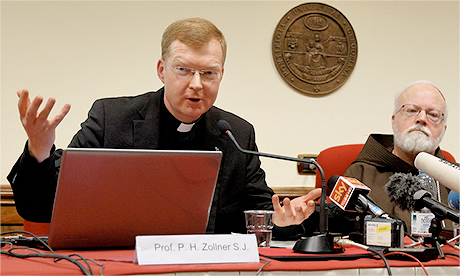Hans Zollner, S.J., is a licensed German psychologist and psychotherapist with a doctorate in theology and one of the church’s leading experts in the area of safeguarding minors.
He is the president of the Centre for Child Protection at the Pontifical Gregorian University in Rome, a member on the Pontifical Commission for the Protection of Minors and a consultor to the Congregation for the Clergy.
What follows is an interview with Hans Zollner.
What is your reaction to what we’ve seen in the United States and elsewhere over the last month?
The strongest impression I have is that it has now reached another level.
The discussion and the awareness and the intensity, especially in the United States, is very surprising because you have gone through this for many years already.
And it brings out the American [social and political] divisions that are visible in the country and in the church.
But why is it so shocking for so many, left and right of the divide?
It is because the extent of the cover-up by church leaders in the past and their co-responsibility for it (no matter what their ideological persuasion) are becoming clearer now.
And then the question is how people deal today with all these issues.
The McCarrick issue I also see somehow linked to the #MeToo movement insofar as #MeToo gave people permission to really confront the untouchables, to get at those persons you never dared to talk about or accuse.
Those who were once attributed with “divine personalities” are now within reach—close enough to be questioned and criticized.
And when it comes to the church, the main focus is no longer on abusive priests but on bishops who covered up. That is something very new, very recent.
It has been there, yes, but the intensity now shows there is another level of sensitivity and another level of need for transparency and authenticity.
It is interesting to hear you talk about how the untouchables have become altogether approachable now. The attacks on the pope would seem like the ultimate expression of that.
Yes, the pope is no longer untouchable.
And I think that is a result, first, of Pope Benedict’s resignation, which has shown as clear as daylight that a pope is a human being.
He has demystified the papacy by stepping down; then Pope Francis’ being so real, so accessible, is certainly also one of the factors that allow people to feel entitled to attack the popes, very personally (and without, I would say, the necessary respect).
And I believe this is precisely in the line of Francis’ understanding of the papacy, of the episcopacy and of ordination—sacrosanct priests are now a thing of the past.
Just as you can criticize politicians and other officials if they don’t do what they’re supposed to do, you can openly speak about the hierarchy’s failings.
What do you think are the next concrete steps the church in the United States has to take?
I would say the bishops need to commit to a code of conduct, and procedures need to be put in place in case there are more allegations of cover-up.
It could be a model for the whole church, if they committed themselves to a process.
For example, there is a bishop that is accused.
Okay, we will call together a jury, or whatever you might call it, of people, a mixed commission, and they will sort out things; they will test the allegation and if there is a confirmed allegation, okay, we report to Rome.
A consequence of such a proposal could also be that they determine procedures in Rome.
Pope Francis, with his motu proprio “Like a Living Mother,” has made a start, but we don’t know whether that was followed through and what kind of process is in place in case an allegation comes up.
What do you mean by “a mixed commission”?
Laypeople, priests, bishops—all experts who are capable of taking evidence.
One of the problems that we have is that in canon law we don’t have a detailed and clearly defined list of punishments for clearly defined crimes, so we will need that.
We will need to know what will be the concrete measure of punishment for a bishop who has covered up abuses.
Also, let’s say you’re at a Catholic school and it is “Brother Brown” who abuses.
To whom do you write? It is not the Congregation for Clergy. It is not the Congregation for Doctrine.
It’s the Congregation for Religious because we’re talking about a brother, not a priest.
But again, until now the punishments for a non-cleric who has abused a minor are not specified. T
here is no church-specified punishment for any layperson either. That is also something that I would say we need to revise. Continue reading
- Image: America
